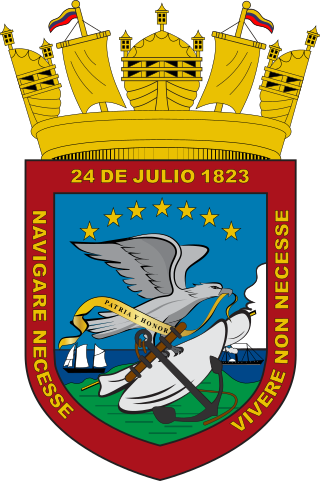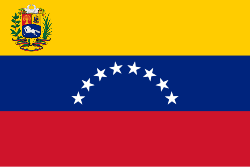Top Qs
Timeline
Chat
Perspective
Bolivarian Navy of Venezuela
Military unit From Wikipedia, the free encyclopedia
Remove ads
The Bolivarian Navy of Venezuela (Spanish: Armada Bolivariana de Venezuela), commonly known as the Venezuelan Navy, is the naval branch of the National Bolivarian Armed Forces of Venezuela.
This article possibly contains original research. (April 2021) |
The Venezuelan Navy serves the purpose of defending the naval sovereignty of Venezuela, including inland and fluvial security, and it also serves to prevent illegal activities on Venezuela's borders and collaborates with international organizations to safeguard international waters from criminal activities.[not verified in body]
Remove ads
History
Summarize
Perspective
The Venezuelan Navy was born as a coastal defense force during the beginning of the Venezuelan War of Independence. In May 1810, Commander Lino de Clemente, a veteran officer of the Spanish Navy who joined the April 1810 coup against the colonial government, was appointed the first Minister of Defense of the republic and began the building of the armed forces including the formation of the navy.[citation needed]
In April 1811 the Nautical School, with Ensign Vicente Parrado as its first superintendent, was opened by order of the national government in La Guaira to train future naval officers, months before the Venezuelan Declaration of Independence. The Navy's origins start from this date, with its first vessels being those formerly used by the naval forces of the Captaincy General of Venezuela, which participated in its first actions in the campaigns in Guayana in 1811-12, the baptism of fire for the fledgling naval service.[according to whom?] Colonel Antonio Mendoza from the Venezuelan Army was its first commanding general.[citation needed]
For a long time their vessels, even if obsolete, were maintained properly by its sailors. In 1937 the Navy acquired from Italy two gunboats of the Azio class and rechristened them General Soublette and General Urdaneta. These ships remained in service until 1951,[1] other sources state 1948[2] or 1950,[3][4]) and were scrapped later.[5][6]
2000s
In September 2008, the Russian Navy's nuclear-powered missile cruiser Pyotr Velikiy, accompanied by three other ships of Russia's Northern Fleet, sailed from its base in Severomorsk on a cruise to the Caribbean Sea for a joint exercise with the Venezuelan Navy.[clarification needed] This action represented the first major Russian power projection in the region since the end of the Cold War.[7][8] Additional ships included the anti-submarine warship Admiral Chebanenko, a tug boat, and supply ship.[9]
Crisis in Venezuela
During a 2019 crisis[clarification needed] in Venezuela, the Venezuelan Navy became engaged in the conflict when it began to prevent the entry of humanitarian aid into the country.[10] A ship departing from Puerto Rico attempted to ship aid into the Venezuelan port city of Puerto Cabello.[10] Six vessels of the Venezuelan Navy, including the Mariscal Sucre-class frigate Almirante Brion and patrol boats, were deployed to prevent the entry of the aid shipment.[11] The ship, carrying civilians, returned to Puerto Rico after the Venezuelan Navy threatened to "open fire" on the humanitarian ship.[10] Governor of Puerto Rico Ricardo Rossello, who ordered the return of the ship, stated that the act by the Venezuelan Navy was "unacceptable and shameful" and that Puerto Rico "notified our partners in the U.S. government about this serious incident".[12]
On 30 March 2020, the Venezuelan patrol boat Naiguatá sank after a collision with the polar ice class cruise liner RCGS Resolute, while in international waters.[13][14] According to RCGS Resolute's owner, the Coast Guard ship had fired shots[14] and ordered the cruise ship to follow it to Margarita Island, a Venezuelan harbour.[15] Naiguatá sank following the collision, with RCGS Resolute informing the international Maritime Rescue Coordination Centre (MRCC) of the incident and offering assistance. After staying in the area for an hour, RCGS Resolute was informed through MRCC that assistance was not required as Naiguatá's crew had been rescued by the Venezuelan Navy.[16]
According to the Portuguese after-incident investigation, RCGS Resolute had departed Buenos Aires on 5 March and sailed to the Caribbean Sea. She was contacted by Venezuelan patrol boat Naiguatá on the night of 30 March. Two hours later, an unexpected change in Naiguatá's heading just before the collision may have been caused by a suction effect between the vessels as the faster patrol boat passed the bow of the cruise ship. Although the collision may have not been intentional ramming, the conclusion was nonetheless that the incident that led to the sinking of Naiguatá was a deliberate act initiated by the Venezuelan Navy rather than an accidental occurrence.[17]
Remove ads
Organization of the Navy
As of 2024, Admiral Neil Jesús Villamizar Sánchez was the Commanding General of the National Navy.[18]
Naval Operations Command
The Naval Operations Command is commanded by the Chief of Naval Operations. In 2014, this was Vice Admiral Antonio Díaz Clemente.[19][needs update]
Venezuelan Naval Aviation
Venezuelan Naval Aviation serves as the air arm of the Venezuelan Navy, with responsibility for air operations and transport for the entire Navy.[20]
Coast Guard
Headquartered in La Guaira, Vargas, the Venezuelan Coast Guard is responsible for the surveillance of Venezuela's jurisdictional waters.[21]
Remove ads
List of current and former ships
Summarize
Perspective
Fleet forces and Coast Guard ship organization
Summarize
Perspective
Light frigates

Offshore patrol vessels

- Four Spanish-made offshore patrol vessels of the Guaiquerí class. One ship, PC-22 Warao is out of service. It was taken to Fortaleza, Brazil following a grounding incident in 2012,[38] and subsequently to Rio de Janeiro.[39][40]
- PC-21 Guaiquerí, in service as of 2011[41]
- Four Spanish-made offshore patrol vessels of the Guaicamacuto-class patrol boat. One ship, GC-23 Naiguatá, was sunk after it rammed a cruise ship in 2020.[42]
- GC-21 Guaicamacuto, was in service as of 2011.[43] Current operational status unknown.
Amphibious and service ships
- Four Capana-class LST.
- T-61 Capana, into service 1983, as of 2001[update].[44][better source needed]
- T-64 Los Llanos, into service 1983, was still in service as of 2001[update].[44][better source needed]
- One Ciudad Bolívar-class supply ship.
- T-81 Ciudad Bolívar, was in service in 2001[45][full citation needed]
- One Bricbarc type/Simón Bolívar training sailboat.[46]
- One Almirante Francisco de Miranda-class tugboat[47]
Coast guard ships

In 2006, Venezuela had four patrol boats, 2 more Venezuelan-built by 2008, and perhaps some others which are not verified. It is unclear how many, or if any, are still operational in 2023.[46]
- Four USCG Point-class patrol boats, as of 2006[update].[46][48]
- Damen Stan 2606 vessels, built in Venezuela, similar to the United States Coast Guard's Marine Protector class, as of 2008[update].[48][49] One already in service by 2008, plus 1 more completed by 2008. Up to 5 more might be built.[50]
Naval aviation assets

Airplanes
Helicopters
Remove ads
Ranks
Commissioned officer ranks
The rank insignia of commissioned officers.
Other ranks
The rank insignia of non-commissioned officers and enlisted personnel.
Remove ads
See also
References
External links
Wikiwand - on
Seamless Wikipedia browsing. On steroids.
Remove ads








































